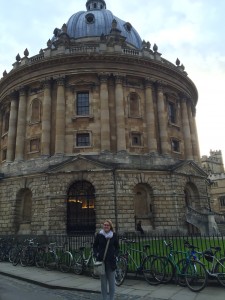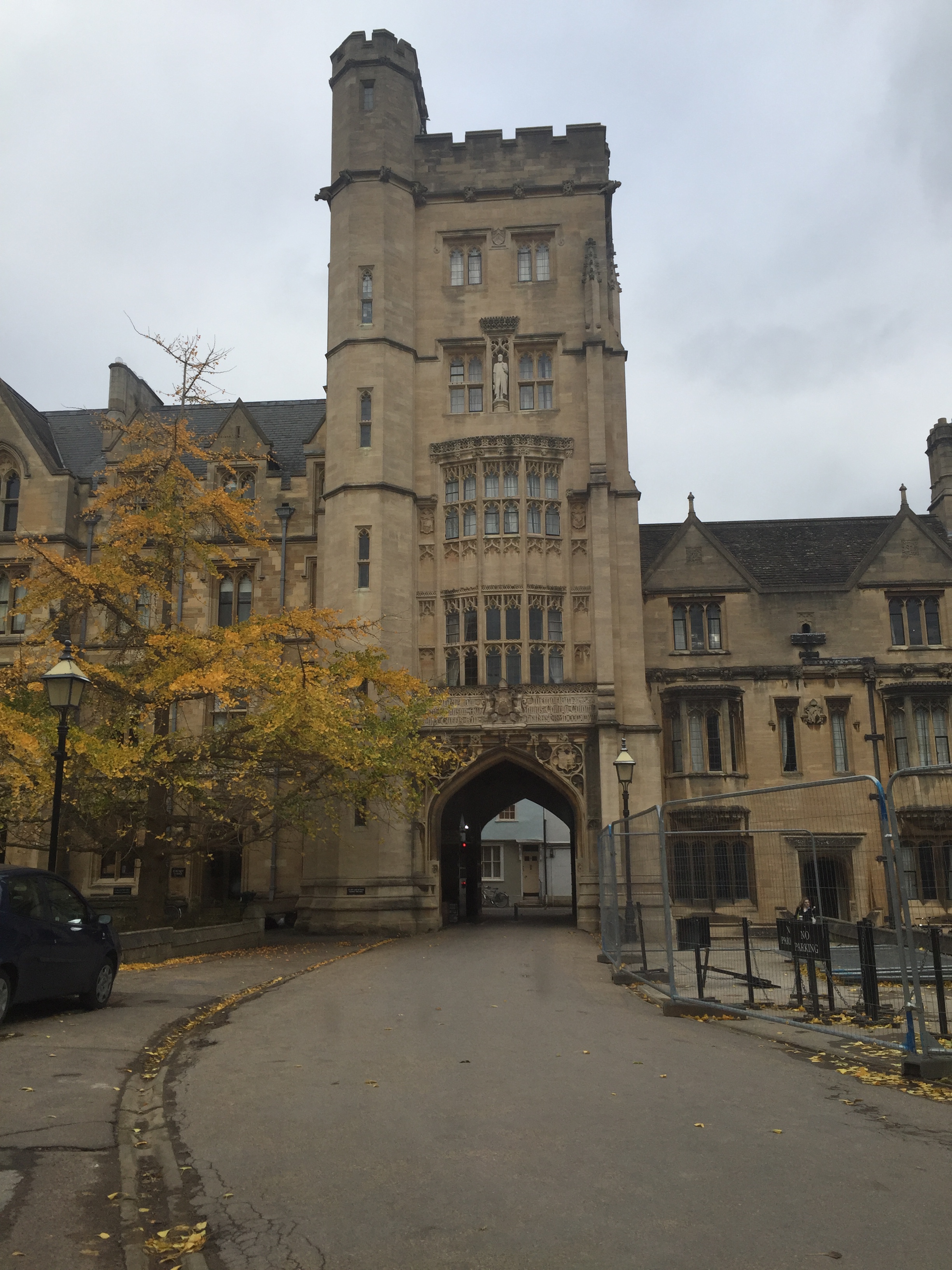Pre-departure:
In November 2015 I was lucky enough to be invited to Oxford University, in Oxford England, to participate in a 2 week long Social Network Analysis course presented by their Social Psychology Department. The catch, however, was that I had less than a month to organise everything I needed for the trip. My supervisor and I approached the coordinators at the student exchange and mobility program to acquire the funding needed for this training course. They were extremely helpful and gave us everything we needed for the application process. I received support for this trip from the Psychology Department at Stellenbosch University, as well as my supervisor. Once my application for funding was submitted all I had to do was wait.
Once the funding was approved I had a checklist of everything that needed to be done. Firstly I had to organise plane tickets to London Heathrow Airport, as well as transportation from the airport to Oxford University. I was travelling with a group of 2 other Stellenbosch students and my supervisor, so we decided to do a group booking for our plane tickets. We finalised our plane tickets through the travel centre in the Neelsie. This is probably the easiest way to plan your travel needs as they are able to get the cheapest and fastest flights for you. It also alleviates the stress of you having to find the flights for yourself.
Luckily, accommodation during my 2-week stay had already been organised by my supervisor. I would stay for 2 nights at one of the boarding houses, New College, and there after I would stay in a bed and breakfast just outside Oxford; in a place called Summertown. Next was the visa application. You need to make an appointment with the UK embassy in Cape Town. It is best to do this as early as possible to avoid any additional costs. Owing to the late notice about this course I was forced to apply for an expedited visa, at an additional cost. You need to provide the embassy with your plane tickets, where you will be staying during your visit, and how you will be paying for your expenses while abroad. The best advice I can give here is to try and do this all as early as possible.
Once you have received your visa you can now get excited (and nervous) about your academic adventure. Before you leave make sure you know if there is anything you may need to bring for the course you are taking. For example, my course required that we bring a laptop and download the programs that we would be using during the course. Another important piece of advice; check the weather! I know this seems silly, but it is best to be prepared. I did not realise how cold it would be during my stay and was forced to purchase a winter coat while I was there (one which I will probably get no use out of in South Africa). Lastly, make sure you bring an adaptable plug for your host country.
Experience at the Host University:

Arriving at Oxford University was like walking into a whole new world. If you thought Stellenbosch University had some beautiful old buildings, you have yet to see Oxford. The boarding house I stayed in can only be described as a castle, and is more than 600 years old. I started my 2-week course on Social Network Analysis the day after I arrived. I felt like I was being thrown in the deep-end, but not at all in a bad way. The course was fast-paced and packed with information. The lecturer who taught us was approachable and friendly, but scarily intelligent. He offered each of us one-on-one advice for our Masters Research projects. This was invaluable for my academic progress.
During our stay we were lucky enough to experience both a first-year undergraduate lecture, as well as a ‘tutorial’. I was quite nervous for the lecture as I though it would be quite similar to a first year lecture at Stellenbosch University. I expected to walk in and find a room filled with +1000 students. How wrong I was. When I walked into the first-year social psychology lecture there were about 10 students, maybe even less. This was a real surprise for me. Oxford University accepts very few undergraduate students. The reason they do this is so that each student can receive individual attention and perform at the highest possible level.
I had a similar experience with the first-year ‘tutorials’. As a Stellenbosch student I am familiar with the concept of a ‘tutorial’. It is a smaller group of students (16-20) who get together once a week and either complete a task for that week or cover the content that was presented in the lectures again. At Oxford University the ‘tutorials’ are a little different. Each first-year student is assigned a fellow (a Professor at the university) who is an expert in their area of study. There are no more than 3 students per fellow, and these students meet with their fellow once a week. Each week they are assigned an essay and during their tutorial the fellow provides them with in depth feedback on the merits and shortcomings of their essay. During this time they also engage in an in depth discussion on that week’s essay question. In this way each student is given personalised feedback, feedback which will make them grow personally and academically. This process is something that sets Oxford University apart from other universities and it was an experience I will take home with me.
I also had the opportunity to interact with numerous doctoral and post-doctoral students who are doing research in my area of interest. Being able to discuss my research and passions with students who are as passionate and invested in their research as I am was an experience I will never forget. These doctoral and post-doctoral students form what is known as a lab-group, and they work collaboratively with each other, providing help and support when their supervisor is not available. This is something I think Stellenbosch can benefit from, as masters and doctoral students are often isolated.
Return to Stellenbosch:
Coming back to Stellenbosch after an adventure like Oxford was bitter-sweet. During my time at Oxford a number of violent protests took place at Stellenbosch University. Watching the protest action from the side-lines gave me a new appreciation of my academic career and achievements. It is a shame that my trip was only 2-weeks long given the amount of personal growth and knowledge I gained from my short stay. I can only imagine what would happen if I could have stayed a whole year. I feel that this was not the last time I lay eyes on the breath taking dreaming spires of Oxford.
I can honestly say that this trip to Oxford University has changed my outlook on my academic career. I feel inspired by not only the people I met and interacted with, but by the place itself. You cannot help but feel motivated when you are surrounded by so much history and greatness. I would recommend an exchange to anyone attending university. It provides you with an opportunity to experience the world in a way you never have. It changes your perspective on learning and may even inspire a change in plans. It opens you up to new and exciting opinions and points of view. So if you ever get the chance to participate in an exchange I suggest you take it. I know if I have the opportunity to travel abroad again I will seize it.
However, I will say that if and when you do partake in an exchange it is entirely up to you to get as much out of the experience as you can. You need to take the initiative, network and interact with as many people as possible. You will not have the amazing experience I had if you spend the entirety of your trip in a coffee house consumed with thoughts of home. Take this exchange as the one time you should say “YES” to everything and anything. Do things you would never have done before. Make friends, connections and memories. Explore every inch of the place that you can before you have to leave. When I wasn’t busy with lectures or my course, I was exploring Oxford. I went to every museum I could and tried to take in as much of the town as I could. Be greedy with how much knowledge and experiences you want out of your stay. I promise you that if you make the best of it, it will make the best of you!

